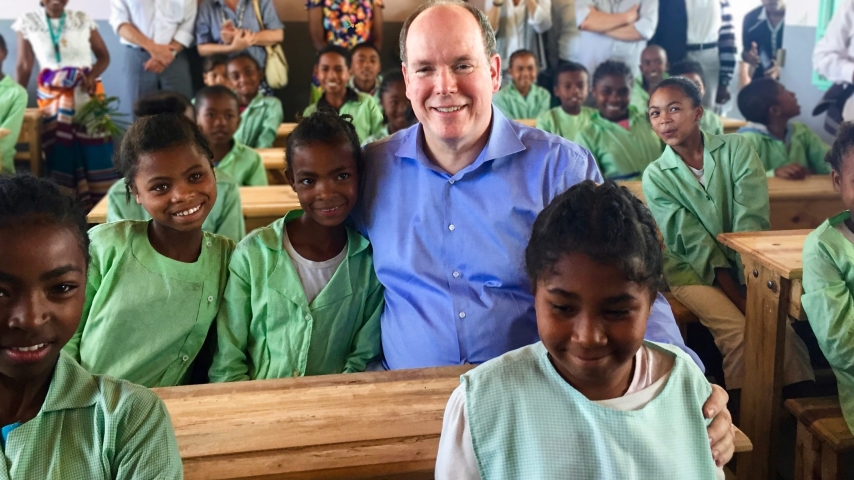
Since its first mission, Monaco Aide et Présence (MAP) has been supported by Princess Grace, with Prince Albert II later taking over and participating in several humanitarian missions.
From its beginnings, MAP has established a global network of support and assistance across continents. With projects in Asia, Africa, America, and Europe, MAP embodies Monaco’s humanitarian commitment on a worldwide scale. Over its 45 years of existence, the association has implemented 1103 projects in 28 countries, mobilizing a budget of 27 million euros to aid distressed populations.
MAP was founded 45 years ago by a group of volunteers led by Anna-Marie Ledu and her husband, the former director of Saint-Maur school, now Saint-François d’Assises – Nicolas Barré. Along with Dr. Richard and some student mothers, the group embarked on a mission to Cambodia during Pol Pot's bloody civil war, which claimed between 1 and 1.5 million victims. This impactful experience motivated them to continue their commitment.
Upon their return, welcomed and supported by Princess Grace, they founded Monaco Aide et Présence. The association soon gained the high patronage of Prince Albert II, who participated in several missions, including one to Madagascar in 2017 to inaugurate the extension of Albert II College, now serving 19,000 students.
MAP aids all populations in distress, without targeting any specific group. "MAP’s statutes mandate aid to populations in distress, not specifically for children or any particular group," says Donatella Campioni, current president of MAP. Joining as a volunteer 17 years ago, she initially sponsored children from orphanages in Sri Lanka and India before fully joining the association, encouraged by then-president Josiane Lahore. She engaged in various actions, including those in Madagascar, before taking over as president.
Since its inception, MAP has assisted 28 countries worldwide. The association’s missions are diverse but guided by two fundamental principles: empowering local populations and passing the baton.
"We must know how to pass the torch; we cannot be everywhere," emphasizes Donatella Campioni. A notable example of this philosophy is the project in Sri Lanka, where MAP entrusted the management of an entire complex to the local diocese. Local dioceses or congregations, rather than governments, usually take over completed projects, with the exception of Benin.
Westerners, despite their goodwill, can make mistakes by imposing their models. Therefore, collaborating with local partners who understand the realities on the ground is crucial for MAP. "We are part of another reality and have no idea of their reality," explains Campioni. "The key is having reliable people on the ground. Without that, it is impossible to do good work." To ensure effective interventions, MAP signs agreements with local NGOs, allowing for tailored and respectful actions.
One of MAP's primary goals is improving "the condition of women, which is very difficult in Africa and even in India," explains Campioni. For the past ten years, the association has supported 140 young girls in Ethiopia, providing housing, food, and education to protect them from forced marriages and early pregnancies that endanger their health. Thanks to this initiative, many beneficiaries have pursued their studies up to university, with some becoming doctors.
In India, MAP operates in 96 villages, assisting 150 families affected by HIV in the Dindigul district in southern India. Although AIDS is not as widespread as in Africa, those affected face severe social stigma. "People prefer to die rather than seek treatment," says Campioni. MAP provides quality food to those infected and raises local community awareness to improve the perception and treatment of individuals.
MAP also engages in local interventions. In France, the association supports organizations aiding disadvantaged families in Nice, develops social grocery stores, and responds to natural disasters like Storm Alex in Breil-sur-Roya. The hospitals of Archet and Lenval also benefit from its support. A new project is expected to begin soon with the Lenval Children’s Hospital and CHPG, addressing the rising suicide attempts among adolescents.
Monaco Aide et Présence is managed by a team of nine administrators, around fifty members, and thirty volunteers. Their mission is clear: respond quickly and effectively to aid requests. Administrators meet monthly to analyze requests, assess emergencies, and allocate resources.
To cover administrative expenses, the Prince provides an annual sovereign grant, covering the association’s premises and the salary of its sole employee, who coordinates numerous projects. This financial model ensures that all donations are used directly to aid those in need, without any deduction for operational costs. Administrators also cover their travel and accommodation expenses, ensuring optimal fund allocation.
Despite its successes, Monaco Aide et Présence must plan for the future. While the current team is very active, they are looking for successors. New administrators are needed to bring fresh ideas and develop new projects to ensure the association’s continuity, which helps thousands of people every year.
